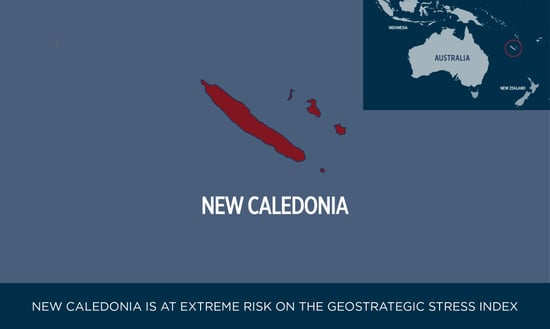The following analysis is part of Global Guardian's 2025 Global Risk Assessment and Geostrategic Stress Index (GSI), a predictive model that shows what countries are most likely to undergo a polycrisis in the next five years driven by geostrategic concerns. For more information, download and explore the 2025 Global Risk Map.
Current Situation
On 13 May 2024 a controversial French reform of the local electoral law that governs the territory was passed, sparking highly violent and widespread protests. Since the beginning of the unrest in May, roughly 11 people have been killed, over two billion dollars of property has been damaged or destroyed, and critical medical, transportation, and energy infrastructure has been severely disrupted. On 15 August 2024, a protester was killed in an exchange of fire with security forces in Thio, a hotbed of pro-independence resistance as well as an important center of the island’s critical nickel mining sector.
Thousands of French security forces remain on the island, a curfew is in effect, and pro-independence organizations continue to agitate for a full break from France. Outside powers, including China and Azerbaijan, have exacerbated the unrest through information campaigns.
History
New Caledonia is an overseas French territory in the South Pacific, approximately 1000 kilometers east of Australia. France colonized New Caledonia in the mid-19th century. Since its colonization, New Caledonia’s native Kanak population has experienced discrimination and economic exploitation. In the 1980s, ethnic and economic tensions erupted into a civil war that saw assassinations and kidnappings, as well as dozens of fatalities and thousands of injuries. This spate of violence ended with France’s recognition of the Kanaks as New Caledonia’s native population and a commitment to New Caledonian autonomy or eventual independence under the “Noumea Accords” framework.
The Noumea Accords froze voter rolls, assuaging the Kanaks’ main fear that, over time, European immigrants would come to outnumber them and vote away their independence aspirations. The Accords called for three rounds of referenda (2018, 2020, and 2021) based on frozen voter rolls where only citizens who were residents of New Caledonia in 1998 could vote. Pro-Independence factions in New Caledonia rejected the outcome of the referenda as illegitimate and characterized Paris’s move to unfreeze the voter rolls as “recolonization.” However, New Caledonia’s nickel deposits make it difficult for Paris to relinquish this territory.
Threat Vectors
- China’s interest in New Caledonia lies in its desire to reorient the Pacific’s geostrategic order towards Beijing. By positioning itself as a powerful patron for the Kanak people, China is setting itself up for economic and political favor in a potential post-independence future for the island.
- Azerbaijan’s principal geopolitical rival is Armenia, which has recently seen increased military and political support from France. New Caledonia presents Baku with a chance to punish Paris and deter further French support for Yerevan. Azerbaijan’s support for Kanak independence is part of a larger Baku initiative that provides assistance for 14 other independence movements from the French West Indies to Corsica.
Industry Impact
New Caledonia holds between 20% and 30% of the world’s nickel reserves. The industry – which has a tumultuous connection to the island’s colonial history – has all but collapsed in New Caledonia. Between sanctions on Russia — a significant nickel producer — and the unrest in New Caledonia, nickel prices rose over 8% between the onset of unrest in May and 10 June 2024.
OutLook
- The outcome of the New Caledonian unrest is largely dependent on domestic French politics. If the territory is granted outright independence, it is likely to form a closer relationship with Beijing and potentially Baku. If France attempts to maintain control without major concessions to the Kanak people, then agitation by Azerbaijan, China, and other French adversaries, including Russia, will continue and likely as opportunities to help foment unrest arise.
Global Guardian's annual Risk Map displays country-specific security risk levels based on a series of indicators including crime, health, natural disasters, infrastructure, political stability, civil unrest, and terrorism.
This year's addition, the Geostrategic Stress Index (GSI), attributes a low to extreme categorical risk rating that forecasts the likelihood of a local crisis taking on regional or global dimensions as countries navigate new cold war relations.
To download your copy, complete the form below.




